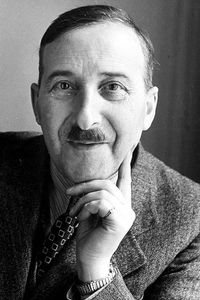Stefan Zweig was born into an educated Jewish middle-class family in Vienna, Austria, where he grew up alongside his brother Alfred. The Zweig family was non-religious and Stefan passed his high school diploma at the Wasagymnasium in Vienna. He began writing poetry at this time, influenced by writers such as Hugo von Hofmannstahl and Rainer Maria Rilke.
In 1901, Stefan Zweig published his first volume of poetry, "Silberne Saiten", and began translating works by French writers. He went on to complete his doctorate in German and Romance studies in 1904 and spent the next few years traveling extensively through Europe, engaging with other writers and artists through correspondence.
Stefan Zweig's writing style evolved over the years, and he approached an intuitive psychological style with his work "First Experience. Four Stories from Kinderland". He was drafted into the war press quarters in 1917 and wrote the drama "Jeremiah" to demonstrate against war, which premiered in Zurich in 1918.
After the war, Stefan Zweig settled in Salzburg and began to warn against radicalization through nationalism and to call for calm, diplomacy, and patience. He published numerous essays and writings, including "Fear", "The Compulsion", and "Three Masters". He also enjoyed great stage success with his adaptation of Ben Jonson's "Volpone" in 1926.
Stefan Zweig's works were published in Russian in the Soviet Union in 1928, and he traveled to the Soviet Union, where he corresponded with Maxim Gorki. However, after the NSDAP came to power in Germany, Stefan Zweig fled to London for fear of persecution and wrote the book "Impatience of the Heart".
His works were no longer published in Germany and Austria after the annexation of Austria to the Third Reich in 1938. Stefan Zweig received English citizenship from Great Britain in 1940 and left Europe, traveling to New York and then settling in Brazil.
























